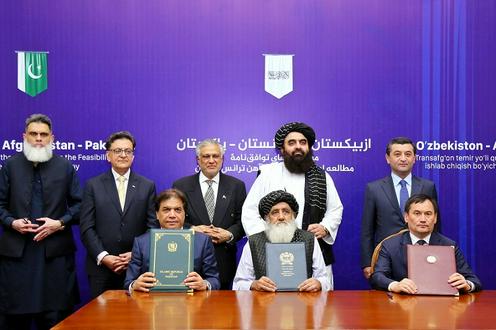Uzbekistan, Pakistan, and Afghanistan have signed an intergovernmental framework agreement to develop a feasibility study for the proposed Trans-Afghan railway route: Termez–Naibabad–Maidan Shar–Logar–Kharlachi. The signing was announced by the press service of Uzbekistan Railways (Uzbekiston Temir Yullari).
The agreement was concluded on July 17 in Kabul during a trilateral summit attended by the foreign ministers of the three countries. The document was signed by Uzbekistan’s Minister of Transport Ilkhom Makhkamov, Pakistan’s Minister of Railways Muhammad Hanif Abbasi, and Afghanistan’s Acting Minister of Public Works Muhammad Esa Sani.
The route was initially agreed upon in Islamabad in July 2023. Oversight for the feasibility study will be provided by a trilateral project office focused on developing international transport corridors. The office was established in Tashkent in May 2023 and has branches in Kabul and Islamabad.
▶️ On the same day, July 17, the Trans-Afghan railway was also the subject of a meeting between Uzbekistan’s Foreign Minister Bakhtiyor Saidov and Afghanistan’s Acting Minister of Interior Sirajuddin Haqqani. Saidov noted that trade turnover between Uzbekistan and Afghanistan had nearly tripled over the past year. He emphasized that stronger ties and expanded cooperation between Afghanistan, Uzbekistan, and Pakistan were promising and beneficial for the entire region. Saidov also reiterated Uzbekistan’s support for unfreezing Afghan financial assets, resolving the refugee crisis, and integrating Afghanistan into regional and international platforms.
Haqqani, in turn, praised Uzbekistan’s “spirit of goodwill, constructive cooperation, and brotherhood,” and highlighted the strategic importance of the railway project and its potential to drive economic growth across the region.
First proposed in 2018, the Trans-Afghan Railway project aims to connect Termez in Uzbekistan with Mazar-i-Sharif and Kabul in Afghanistan, and further to Peshawar in Pakistan. Once completed, the railway will span more than 700 kilometers through Afghanistan, creating a direct overland trade corridor between Central Asia and the Arabian Sea. Initially estimated at $5 billion, the project’s cost has since been revised to $7 billion. One proposed implementation model is a public-private partnership under a build–operate–transfer scheme.
The project has received backing from Russia, Iran, and international financial institutions. It is expected to reduce cargo delivery times from Central Asia to Pakistani ports from several weeks to just a few days.










